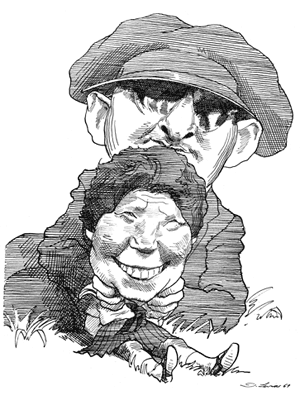“Oh, those ever-changing moods of Moscow! How swiftly they go from black to white, from one extreme to another, from friendship to accusations, from adoration to hatred, from the permissive ‘da’ to that annihilating ‘nyet.’ Those eternal swings from a thaw to a freeze, whims that disregard their own rules, norms, and regulations! Unhappy land, unhappy people, who instead of promised freedoms got nothing but whims—whims far worse than those of any emperor…” So writes Svetlana recalling the bureaucratic snarls that entangled her in Delhi when she was trying to leave the city for a countryside distant from Soviet deputies and there to consign her husband’s ashes to the Ganges where it flowed beside his native ground.
She had been told that she could make the journey, then told she could not, then, when she reached a fury of frustration, she was permitted, after all, to go: even so, at the eleventh hour, there was a change of schedule and a further maddening, needless delay. The watchdogs did not reckon on her purpose; her resolve not to go back home began to evolve in hot, dirty Kalakankar in the heart of India. Because she is inalienably Russian herself (although her international and interdenominational God persuades her that in a larger sense she is a citizen of the world) she is as mercurial as Moscow personified and in this troubled, valorous, disjointed, touching memoir, her register shifts to accommodate her repertoire of lamentation, diatribe, carol of joy, and paean of thanksgiving. She is fidgety and voluble, she is winsome, she is austere. “Modesty embellishes a Bolshevik,” her father said to her once, and while he was speaking of dress and domestic deportment and was using the word as synonymous with “humility” or “acquiescence,” she may have learned a lasting lesson from the epigram. For she is wholly modest.
It might be argued that she acquired this virtue as a reaction against the arrogance and cynicism of her father and his votaries, or that she came by it when her godliness set in, but in either of those events, she would have consciously assumed a role and the modesty would be false; hers is not: it has its genesis in an intrinsic wholeness, an amour propre which has made her impregnable to the disasters of vulgarity or vainglory. It is a miracle that she has preserved her innocence despite a life-long fare of holocaust and hokum, of chaos and manipulation and madness and massacre. She loves the kingdom of God and she hates the USSR (the very thought of Beria brings on something close to delirium), but she does not try to recruit immigrants to the one or emigrants from the other; her nerves are still raw but her heart is simple.
One is obliged to catalogue and insist upon her moral accomplishment because her testament is, at first reading, uncomfortably embarrassing; the writing is so flaccid and unprofessional that there is no tension in the complex and raging and dramatic episodes of her narrative: the reader does not sit on the edge of his chair and wonder, “Will she get out of Russia?” “Will she make the plane from Delhi to Rome without being seen?” “Will she find asylum in America?” To be sure, she lays no claim to being a writer and the facts in her case are so much in the public domain that perhaps nothing short of a work of fiction would enliven them to my taste. However, neither did Charles Lindbergh set himself up as a writer, and yet when I read The Spirit of St. Louis, although I knew that the author was alive and well in Darien, Connecticut and had been for many years, I flew the Atlantic in an agony of suspense and was at no time sure that we were going to come in for a safe landing at Le Bourget.
Svetlana reports faits accomplis in a way that makes them no more urgent than yesterday’s news: at George Kennan’s house in Pennsylvania, she one day called the children and the baby-sitter of the family “to witness a solemn moment. ‘I am burning my Soviet passport in answer to lies and calumny,’ and she performed the ceremony over a charcoal grill. She is naive—“Near Vevey I saw, in the distance, the villa of Charlie Chaplin, that great actor and humanitarian…” (the italics are mine), and it pleases her to call Nantucket “the Gypsy Capital of Poets.” She makes numerous references to the movie, The Sound of Music, which apparently she admired. She is naive and she can be mushy: “…her kindness, which she generously gave to others, was indeed socially useful, for Liza was like a ray of sunshine, like a shining light in one’s soul, and nothing helps people more than that.” And she is banal: “…the ocean, changing every day, every hour. Inconstant, capricious, at times gray, at others blue, and again black with the white froth of rage.” She is often repetitious, she is often nebulous, she is often pious, she is often dull.
Advertisement
But on reflection, one sees that probably every stick of lumber serves a purpose and that the guilelessness, the sentimentality, the reliance on eternal verities, are not only natural but are, in view of the accident of her birth, necessary and right. And, having come to that conclusion, I brush aside my complaint that her story is wanting in immediacy and power and, contemplating the plain fact of her survival, am impressed. If it was not enough to be the darling daughter of her moody, murdering, peasant-coarse and Georgian-erratic father, she was the daughter also of a beautiful mother who shot herself when Svetlana was a child—she was sixteen when she learned, in the pages of Life magazine, that the death had been by suicide; the understated memory of the last time she saw her mother is dazing:
I remember the very first parade I ever saw on Red Square, in 1932—Mama had taken me to it. I was six and a half years old and my childish impressions were vivid. Next day our governess told Vasily and me to write and describe what we had seen. I wrote, “Uncle Voroshilov rode a horse.” My eleven-year-old brother made fun of me, saying that the proper way to describe it was, “Tovarishch Voroshilov pranced on his steed.” In the end he reduced me to tears and Mama laughed. She had looked into our nursery for a moment, wearing a bright-colored bathrobe, and then left. We never saw her again.
This carping brother would become an alcoholic and die dead drunk at forty-one. Her half-brother Jacob, to whom she was devoted, killed himself in a German prisoner-or-war camp by flinging himself onto an electric fence. The daughter and sister was, as well, the niece of aunts on her mother’s side whom Stalin sent to prison for six years; one of them went mad. And she was the wife in two marriages that went sour and ended in divorce; she is the common-law widow of a gentle, learned aristocratic Indian who died only a handful of years after they met and fell in love; and she is the mother of two children who have officially repudiated her.
While she is grateful for America, and amazed, she is an exile, poignantly reminded of Russia by forests and lakes and farmland, by certain lights and gardens and lanes. And while she moves in a circle of protective and affectionate friends, they are not the old friends with whom she grew up in the dachas by rivers and one-room flats with communal kitchens, with whom she studied and listened to music and suffered and sympathized.
The most interesting parts of the book, of course, have to do with Stalin who emerges lonely and quixotic, self-defeating, unforgiving of his sons who disappointed him and of his wife who deserted him by putting a bullet through her brain. He doted maudlinly on his apolitical daughter until she began to fall for unsuitable men—Jews, and he was intransigently anti-semitio—and to turn to religion and, in general, to comport herself in a way he must have looked on as frivolous. It is instructive to think of him at his dinner table where, surrounded by the Politburo, he offered tremendous feasts of choice food and drink although he was himself moderate in his habits. He liked to see his company drunk; he liked it when they sang ribald songs and told scurrilous jokes about absent members; he did not take part but he looked on thoughtfully, smoking a pipe, as the trenchermen gobbled up pheasant and baby lamb and drowned themselves in vodka and Georgian wines and amused themselves by putting tomatoes on one another’s chairs or adding a spoonful of salt to the booze. He lived in one room and slept on a sofa and, when he dined alone, had a tray at his desk; but dacha after dacha was built for him and as soon as they were finished, he ordered their renovation. When he died—and he died dreadfully—his daughter’s grief, one must believe, was as engulfing as her relief but, quite understandably, not nearly so long lasting.
This Issue
October 23, 1969




